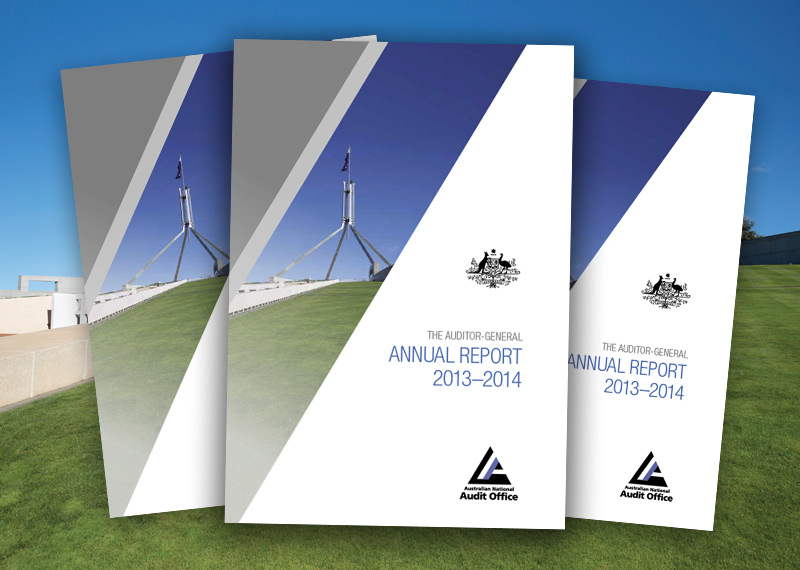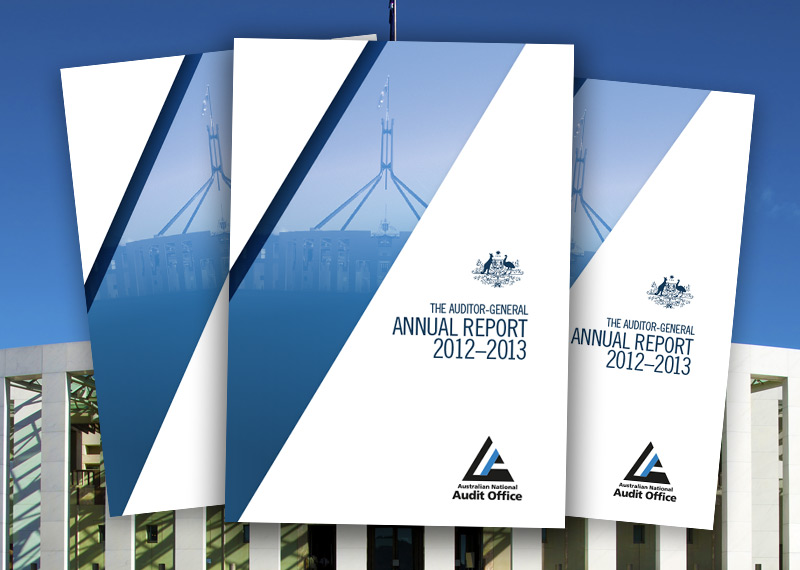Browse our range of reports and publications including performance and financial statement audit reports, assurance review reports, information reports and annual reports.
The Australian National Audit Office (ANAO) publishes two reports annually addressing the outcomes of the financial statement audits of Australian government entities and the Consolidated Financial Statements (CFS) of the Australian Government to provide Parliament an independent examination of the financial accounting and reporting of public sector entities. This report focuses on the results of the interim audit phase, including an assessment of entities’ key internal controls, of the 2016–17 financial statements audits of 25 entities including all departments of state and a number of major Australian government entities.
Please direct enquiries relating to reports through our contact page.
This annual report documents the performance of the Australian National Audit Office (ANAO) in the financial year ending on 30 June 2014. It addresses the Requirements for Annual Reports for Departments, Executive Agencies and FMA Act Bodies approved by the Joint Committee of Public Accounts and Audit in May 2014; the performance measures set out in the outcome and programs framework in the 2013–14 Portfolio Budget Statements; section 28 of the Auditor-General Act 1997; and other annual reporting requirements provided for in legislation.
This annual report documents the performance of the Australian National Audit Office (ANAO) in the financial year ending on 30 June 2013. It addresses the Requirements for Annual Reports for Departments, Executive Agencies and FMA Act Bodies approved by the Joint Committee of Public Accounts and Audit in June 2013; the performance measures set out in the outcomes and programs framework in the 2012–13 Portfolio Budget Statements; section 28 of the Auditor-General Act 1997; and other annual reporting requirements set out in legislation.
The objective of this audit was to form an opinion on the effectiveness of Internet security measures within the Commonwealth public sector. The second objective was to provide better practice guidance for managing an Internet connection. The audit covered a range of Commonwealth agencies which had established an Internet facility. It specifically addressed the following matters : Internet security policies; site management - including change control processes, virus prevention and detection strategies, and incident response plans; controls over access to the Internet site and to data sources connected to the site; and user education and training.
The objective of the follow-up audit was to report on the action taken by the Australian Customs Service to address the recommendations of the 1996 Audit Report. The audit also reviewed key areas of the Passenger Movement Charge administration identified in the 1996 audit, including the appropriateness of formal arrangements between the ACS and Regular Public Transport airlines and assessed the proposed arrangements being developed by the ACS. The arrangements with RPT airlines were a particular focus in the follow-up report (as they were in the 1996 Audit Report), because of the significance of that category of carrier in revenue terms
The objectives of the audit were to:
- evaluate the extent to which the Government's sale objectives were achieved, with a focus on those objectives relating to the optimisation of sale proceeds and minimisation of risk to the Commonwealth;
- examine the effectiveness of the management of the sale process to ensure the Commonwealth received fair value; and
- within the context of broader Commonwealth debt management considerations, assess the application of the sale proceeds to repaying Commonwealth debt and the extent to which public debt interest payments may be reduced.
This audit would examine the effectiveness of the Department of Health, Disability and Ageing’s (Health’s) implementation of star ratings for residential aged care.
The star ratings system was introduced in December 2022. An overall star rating and star ratings in four categories (compliance, residents’ experience, staffing and quality measures) are assigned to residential aged care services on a public facing website (My Aged Care) operated by Health. The star rating system aims to help older Australians and their representatives make more informed choices about their care and to help aged care providers to see where they are performing well and how they can improve. In October 2024 the Commonwealth Ombudsman made a public statement expressing a view that star ratings were not sufficiently meaningful to help people make informed decisions about their aged care. From November to December 2024 Health ran a consultation process on planned design changes to star ratings. Health has stated that an evaluation report was expected to be provided to the Australian Government in early 2025.
Please direct enquiries through our contact page.
This audit would assess the effectiveness of the Department of Finance’s administration of the governance and accountability framework for Government Business Enterprises (GBE), including its support and advice to the Minister for Finance, who is a GBE shareholder minister. The audit may also review entities’ implementation of framework requirements and expectations set out in the GBE guidelines.
A GBE is a Commonwealth entity or Commonwealth company that is prescribed pursuant to the Public Governance, Performance and Accountability Act 2013 and related Public Governance, Performance and Accountability Rule 2014. Ten GBEs have been prescribed. Two GBEs are corporate Commonwealth entities: Australian Postal Corporation; and Defence Housing Australia. Eight GBEs are Commonwealth companies: ASC Pty Limited; Australian Naval Infrastructure Pty Ltd; Australian Rail Track Corporation Limited; CEA Technologies Pty Limited; National Intermodal Corporation Limited; NBN Co Limited; Snowy Hydro Limited; and WSA Co Limited. The Department of Finance provides advice to the Australian Government relating to its GBEs and other commercial entities.
Please direct enquiries through our contact page.
The objectives of the audit were to determine whether FaCS and Centrelink had: a valid Business Case for the Edge project, as revised from time to time, including estimated costs, actual costs, and expected benefits; effective governance of the project, including reviews at critical points in the project and subsequent decisions to continue or, in the final analysis, to discontinue; an appropriate contract with SoftLaw, which was adequately managed; delivered appropriate advice on progress, project viability, and acceptable solutions to technical issues to Executive of FaCS and Centrelink during the project; and valid reasons for discontinuing the project. The ANAO began this audit in March 2004, four months after the Edge project was terminated, following the Auditor-General's agreement to a suggestion by the Joint Committee of Public Accounts and Audit that the project was a suitable subject for audit.
This audit would examine the effectiveness of the Department of Agriculture, Fisheries and Forestry’s (DAFF) management of Approved Arrangements for the importation of live animals. The Biosecurity Act 2015 allows DAFF to approve public or private industry entities (or biosecurity industry participants) to carry out certain border biosecurity risk management activities, in accordance with specified conditions. Approved arrangement (AA) holders are approved to undertake certain biosecurity actions.
Please direct enquiries through our contact page.

